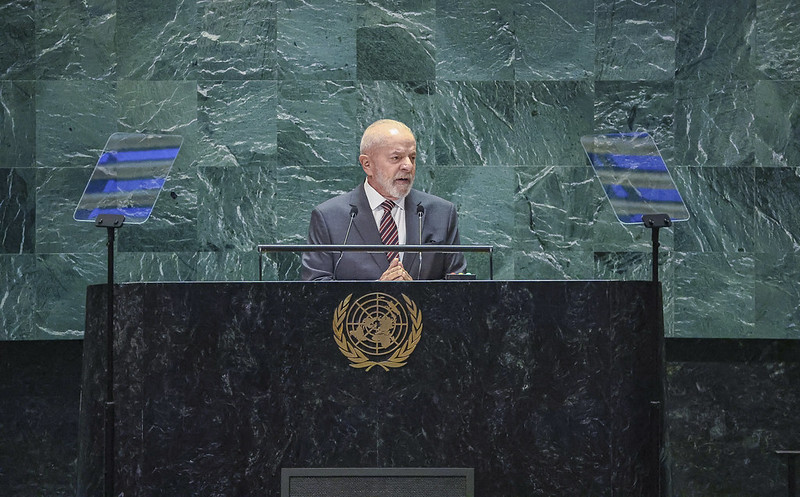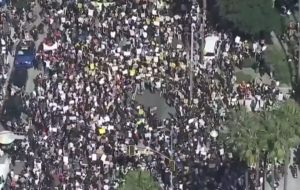
Published 09/22/2024 15:25 | Edited 09/22/2024 15:31
President Luiz Inácio Lula da Silva spoke this Sunday (22) at the opening of the Future Summit in New York. The event is part of the debates held within the scope of the United Nations (UN) General Assembly. In his speech, the president once again highlighted the need to reform the global governance of the organization and other institutions, as a way of giving a voice to the countries of the Global South and of responding appropriately to current challenges. He also emphasized the lack of vitality, legitimacy and boldness of UN bodies.
“The crisis of global governance requires structural transformations. The pandemic, the conflicts in Europe and the Middle East, the arms race and climate change have exposed the limitations of multilateral bodies. Most bodies lack the authority and means of implementation to enforce their decisions,” Lula declared.
Read also: Lula’s agendas reaffirm Brazil’s prominent role on the international stage
The president went on to point out that the General Assembly “has lost its vitality and the Economic and Social Council has been hollowed out. The Security Council’s legitimacy diminishes every time it applies double standards or turns a blind eye to atrocities.”
Lula also highlighted that the Bretton Woods institutions “disregard the priorities and needs of the developing world” and that “the Global South is not represented in a way that is consistent with its current political, economic and demographic weight”.
Reinvigoration of multilateralism
At the beginning of his speech, Lula recalled that the agenda for reformulating global bodies dates back at least 20 years, when the then UN Secretary-General, Kofi Annan, addressed the importance of reinvigorating multilateralism.
On that occasion, the president recalled, “I emphasized, from this platform, the need for reforms so that the UN could fulfill its historic role. That joint reflection bore fruit such as the Peacebuilding Commission and the Human Rights Council. Other ideas never got off the ground.”
Considering this issue and the current scenario, Lula emphasized that there are two major responsibilities “to those who will succeed us”.
The first is not to back down. “We cannot back down in the promotion of gender equality, nor in the fight against racism and all forms of discrimination. Nor can we go back to living with nuclear threats. It is unacceptable to regress to a world divided by ideological borders or zones of influence,” he said.
Read also: Fight against hunger in Brazil is an example for other countries, says UN representative
The fight against food vulnerability, a central point of his work as a leader at national and international levels, was another point highlighted by the president. “To treat the hunger of 733 million people as natural would be shameful. To go back on our commitments would jeopardize everything we have built so hard.”
The president believes that the Sustainable Development Goals, proposed by the UN in 2015, were “the greatest diplomatic undertaking in recent years and are on track to become our greatest collective failure.” This is because, taking into account the current pace, only 17% of the goals of the 2030 Agenda will be achieved within the deadline.
As a way of contributing to overcoming the food crisis that affects millions of people around the world, Lula highlighted that during his presidency of the G20, Brazil will launch a Global Alliance against Hunger and Poverty. The official launch is expected to take place alongside the G20 Summit in November in the city of Rio de Janeiro.
Crise ambiental
Regarding the environmental crisis, Lula emphasized that, at COP28, in 2023, the world carried out a global assessment of the implementation of the goals of the Paris Agreement. “The current levels of reduction of greenhouse gas emissions and climate finance are insufficient to keep the planet safe,” he lamented.
Lula also said that in partnership with the Secretary-General and in preparation for COP30, “we will work towards a global ethical balance, bringing together different sectors of civil society to think about climate action from the perspective of justice, equity and solidarity.”
Second responsibility
The second responsibility highlighted by the Brazilian president is “to pave the way for new risks and opportunities”. For him, “the Pact for the Future shows us the direction to follow. The document addresses important issues such as the debt of developing countries and international taxation in an unprecedented way”.
The Pact was adopted with the consent of 193 countries during the Summit for the Future, a parallel event to the United Nations General Assembly, held this Sunday.
Lula also said that “the Global Digital Compact — an annex to the Pact for the Future — is a starting point for inclusive digital governance that reduces the asymmetries of a data-driven economy and mitigates the impact of new technologies such as Artificial Intelligence. All of these advances will be commendable and significant. But we still lack ambition and boldness.”
Lula concluded his speech by highlighting that “the best legacy we can leave to future generations is a governance capable of responding effectively to the challenges that persist and those that will arise.”
Next Tuesday (24), the president will give the traditional opening speech at the United Nations General Assembly. By tradition, since the 10th session of the summit, the president of Brazil is always the first country to speak.
Source: vermelho.org.br

